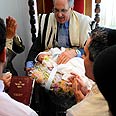
Mohels protest restriction on 'suction' during circumcision
Israel Ambulatory Pediatric Association calls to stop 'oral suction' technique used by cirmcisers during circumcision rite. Mohels: They're not after child's best interest; they're against circumcision'
The suction technique was originally practiced as a way to prevent infection, and is perceived by Mohels who practice it as Halachic obligation.
Rabbi Chaim Moshe Weisberg, an esteemed mohel, told Ynet that haredim will continue to uphold the tradition without any change.
According to Weisberg, the recent controversy surrounding the custom is just an attempt to stop the ritual of circumcision altogether. "They're not after the child's best interest; they're against circumcision," Weisberg said adding that "They want all parents to stop circumcising their sons, as they did in Germany."
Weisberg, descendant of a family of mohels, is certain that the IAPA's battle against the "oral suction" technique will not prevail. "The cases of reported diseases, allegedly originating from the custom are very few – and even then they can't prove it was actually transferred from the mohel."
According to Rabbi Moshe Morciano, head of the Circumcision Division of the Chief Rabbinate, "the Rabbinate instructs mohels to consult the parents; those who are interested in the metzitzah b'peh should have it, and those who aren't – won't."
In 2006, the New York State Health Department suggested that parents sign a waiver if they want their newborn to undergo metzitzah b'peh after circumcision. Said suggestion, published in the New York Times, followed cases of neonatal herpes that were allegedly caused by oral suction.
Fearing the transfer of diseases, the IAPA proposes to replace the traditional practice of metzitzah b'peh, which calls for direct contact between the mohel's mouth and the circumcision wound, by using a tube or pipette to avoid direct contact.










